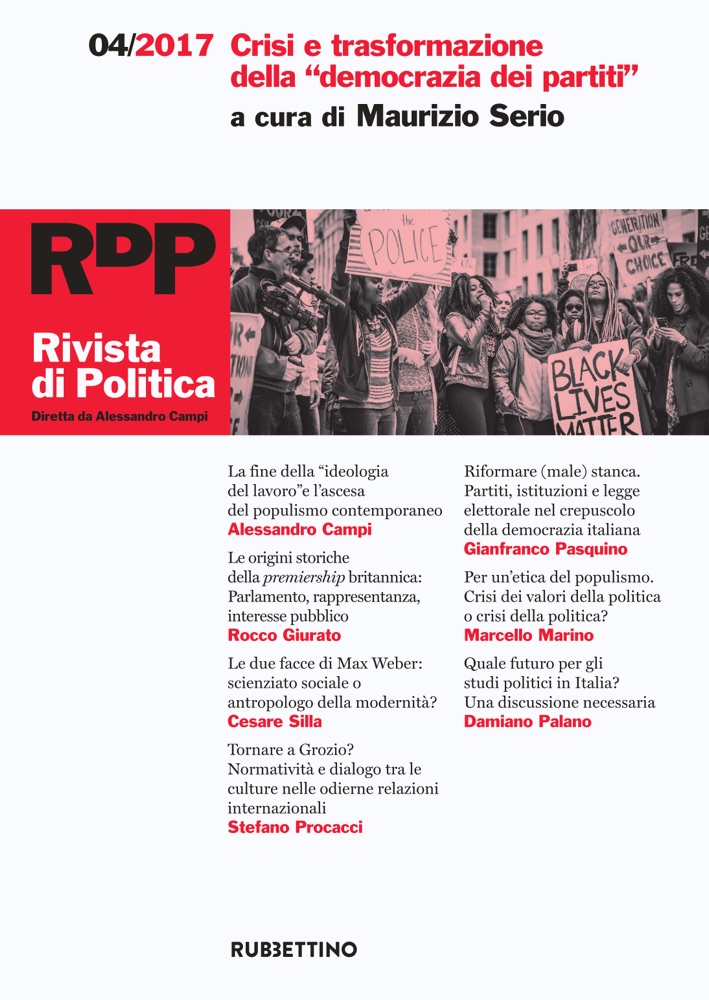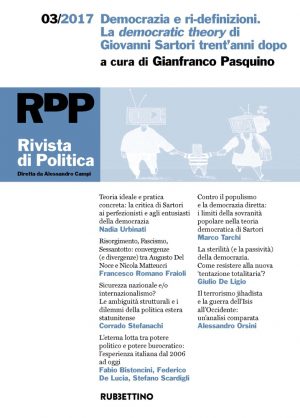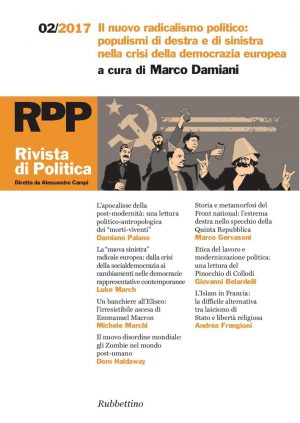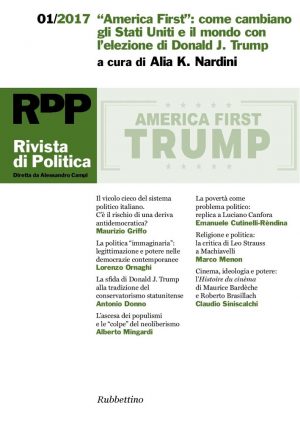04/2017 – Crisi e trasformazione della “democrazia dei partiti”. A cura di Maurizio Serio
ISSN: 2037-495X
8,50€ – 11,00€
Descrizione
congetture & confutazioni
La fine dell’ideologia del lavoro e la crisi della politica Alessandro Campi
Verso le politiche del 2018. Spunti dalle elezioni regionali della Sicilia e dalle municipali di Roma Luigi Di Gregorio
L’Austria dopo le elezioni politiche dell’ottobre 2017: verso un modello di consociativismo competitivo? Paolo Quercia
Una storia di eroi, battaglie e potere: la narrazione di Beppe Grillo e del M5S Chiara Moroni
Leadership o Leader? Alle origini del consenso di Putin Igor Pellicciari
osservatorio italiano
Il rapporto tra cittadini, partiti ed istituzioni e la questione elettorale italiana Gianfranco Pasquino
dossier: crisi e trasformazioni della “democrazia dei partiti”
Nel vuoto della politica europea: la crisi della “democrazia dei partiti” nell’analisi di Peter Mair Maurizio Serio
Il notabilato come categoria analitica della contemporanea trasformazione dei partiti Luca Mencacci
Prospettive ‘social’ della comunicazione politica Carlo Bosna
storia delle idee politiche
«Who is or who is to be the prime minister»? Premiership e pubblico nell’Inghilterra del primo Settecento Rocco Giurato
Su Weber e i weberiani: l’eredità di Max Weber tra scienze sociali e tradizione occidentale Cesare Silla
Tra secolarizzazione e Entscheidung: Carl Schmitt versus Rudolf Bultmann Francesco Saverio Festa
La filosofia civile di Raffaele Mattioli e il problema di una classe dirigente “adeguata” Giulio Azzolini
teoria politica
Etica del populismo Marcello Marino
osservatorio internazionale
Antropologia e politica della Società Internazionale globale: l’attualità del modello “groziano” Stefano Procacci
Il concetto di media potenza dal XIII° secolo ai giorni nostri Gabriele Abbondanza
Il processo di radicalizzazione dei terroristi di vocazione Alessandro Orsini
forum
L’eclissi della teoria politica. Alcuni spunti per una discussione sulla condizione degli studi politici in Italia Damiano Palano
Abstracts
Gianfranco Pasquino, Voters’ Power, Representation, Accountability
Choosing, or reforming, an electoral law is always a highly political decision. Electoral laws may satisfy purely partisan criteria or may pursue systemic goals. Some of them are shaped in order to give advantages to specific parties. Some are drafted with the objective of improving the functioning of the political system. This article explores several different Italian electoral laws and proposals using this simple, though crucial, dichotomy: partisan vs systemic. Since the 2005 center-right electoral reform, all subsequent proposals and, finally (so far), the law approved in November 2017 have sought first of all and above all to serve the interests of the parties, their factions, and their leaders. The power of the voters has been sacrificed to what party leaders consider their (short term) benefit or need: to have full control over the candidates to be elected to parliament. Hence, closed lists have characterized the proposals and are the hallmark of the 2017 law. Two of its major features are here criticized. First, the voters will have no possibility of casting a vote for the candidate in the single-member district and for a different party in the “proportional” constituency, as they are allowed to do in Germany (where they have made good use of this opportunity). Second, closed lists accompanied by the well-known Italian phenomenon of candidates “parachuted” in safe districts and large constituencies in which they have no political roots, will not provide decent representation. No representation no accountability: those parliamentarians will have no incentive to explain to the voters what they have done, not done, badly done. Their re-election will not depend from the voters’ evaluation, but from the whims of their party leaders. Poor political representation will contribute to the Italian crisis of governability.
Maurizio Serio, In the Void of European politics: on Peter Mair’s Analysis
The collapse of 20th century party democracy has started a process of gradual hollowing of European politics. Peter Mair (1951-2011) with a prophetic sense described the effects of the specular withdrawing of both rulers and citizens to their own spheres (institutions and private life). Nowadays, parties are menaced by movements and non-parties organizations in their function of representativeness of the people. In most of the cases, they are maybe responsive but not responsible. Mair says that as long European integration has gone far, the inter-parties competitions at national level is decreased, along with a depoliticization of previous cleavages. Rather, I argue that we are witnessing a hyper-politicization of both public and private spaces, due to the overwhelming prevalence of governments on parliaments.
On the basis of recent studies on the effects of economic crisis on the European party-systems, we may frame this process into the polarization between technocratic and populist trends, as two physiological components of our democracies. In this way, we find that contemporary regimes are heading off towards a sort of “exclusive democracy” rather than an inclusive one.
Luca Mencacci, The Politics of Notables as Analytical Category of Contemporary Transformation of Political Parties
The “crisis of political parties” has always been discussed since their emergence in democratic representation. And yet, despite the auguries of many intellectuals, political parties tend to survive. Like biological organisms that adapt to the arrival of new environmental conditions, they tend to conform to changing social needs or to the evolution of the media. They suffer the great indifference of citizens towards politics, they engage in fancy financing campaigns, but they always recur, always ready for yet another election date. Their ability to adapt seems to be their best feature. When faced with the frequency of changes in their organizational structure, it can be very useful to recover some analytical models of the past that, duly updated, may be able to give back a key to reading the new offerings that are being proposed on the electoral market.
Carlo Bosna, Social Perspectives of Political Communication
The promotion of citizen participation in a democratic society is also possible thanks to the Intergovernmental Government. In this way it is possible to participate in political affairs at local, regional, national and even international level.
The Internet can respond to this need by putting it in the service of the state to reform it, making it more efficient, closer to the needs of the public than the public sector expects the same quality of services provided by the private sector.
The right of citizens to be informed of what is happening in the rooms of power has been amplified thanks to the Internet. In traditional media, service information is almost absent, while it’s easier to access them through the sites of municipalities, regions, ministries, and parliament through numerous websites.
At the bottom there must be greater transparency in information, procedures and decisions.
But the pioneering phase of P.A. It has already been done for a long time, so it is not enough to automate and digitize processes, but you have to think about the contents both from the internal organization point of view and the methods for interfacing with the audience.
There are also some who point out some critical aspects of network communication: there are those who think that computer-mediated communication could strengthen existing forms of interaction instead of creating new ones. In addition, the introduction of new technologies could be a viable situation only for those who already have a good knowledge of the matter.
For this reason, the presence of more information can not always lead to increased participation by citizens.
Rocco Giurato, ‘Who is or who is to be the Prime Minister’? Premiership and the Public in Later Stuart England
Later Stuart age, as has been recently noted, saw the emergence (if not the birth) of the public in England. Starting from the methodological assumption that the evolution of political institutions may be studied by exploring either the structural changes in government or the values circulating among the public, this paper chooses the second option, therefore aims to analyse the emergence of the premiership in the public discourse. Here I consider primary sources produced in the context of post-1689 England which show the commentators’ – i.e. political writers, officeholders, journalists, etc. – reactions provoked by this ground-breaking institutional innovation. Much has been written about Robert Walpole’s rise to premiership, though much less about the rise to power of Sidney Godolphin and Robert Harley in the early seventeenth-century, mainly because they are not fully considered yet as Prime Ministers. The emergence of premiership in later Stuart institutional context caused different reactions from contemporaries, not all positive. In fact, part of the public did not welcome the newly formed figure of the Prime Minister. At a time when change was not seen in a particularly favourable light, such a constitutional change shows anyway an important symptom of the beginning of a new political era in which Parliament was becoming more and more entitled to define from time to time what the public interest was.
Cesare Silla, About Weber and the Weberians: the Legacy of Max Weber between Social Sciences and Western Tradition
The “uses of Weber after Weber” is the focus of a recent book, Weber and the Weberians, Lawrence Scaff published for Palgrave Macmillan in 2014. Scaff is one of the most distinguished, world-renowned scholar of Max Weber, who contributed to the so-called “Max Weber Renaissance” during the Eighties, with his famous book Fleeing the Iron Cage. This essay takes the balance which Scaff has sketched out in his book, about the different ways Weber’s ideas, concepts, methodologies, and research questions have been appropriated in the social sciences, even going beyond his words and sometimes his “spirit”, as the starting point to discuss the alternative genealogy of his reception: the one understanding Weber as part of a much broader Western tradition of philosophical and political thought.
Specifically, by joining a series of insights from the first Italian reception of Weber’s work and the reflections of three of his classic commentators – Karl Jasper, Karl Löwith and Sigfried Landshut – the essay suggests that a distinctive anthropological-philosophical interest was the driving force of Weber’s thought and even of his sociological investigation. In conclusion, the essay argue in favour of a much-needed dialogue between the two traditions, Weberian social science and Weberian thinking within the Western tradition, for it is contended that his empirical sociology was conducted having “ultimate” philosophical-political questions in mind.
Francesco Saverio Festa, Between Secularization and Entscheidung: Carl Schmitt versus Rudolf Bultmann
This article tries to answer to the following questions. According to Jean-Luc Nancy from Locke and Rousseau to nowadays the history of humanity has been nothing more than “the road to a repeated failure of civil religions” facing to the persistence of the revealed religions. On the other hand, however, we can wonder whether Rudolf Bultmann, having philologically and rigorously analyzed the primitive Christianity and having compared it with Carl Schmitt’s decisionism, has indicated the only pathway to project ourselves to the hardcore of Christianity. Moreover, we are wondering if the debunking, or rather the real de-construction of theologian and neutralization of the Religious, nullifying the necessity of the relationship with the Political.
Giulio Azzolini, The Civil Philosophy of Raffaele Mattioli and the Problem of an ‘Adequate’ Ruling Class
The essay analyses the civil philosophy of Raffaele Mattioli, on the basis of his last initiative, namely the foundation in Milan in 1972 of the Association for the study of the formation of the ruling class in the unified Italy (Associazione per lo studio della formazione della classe dirigente nell’Italia unita). To this end, the essay illustrates the genesis and the main characters of that experience and it considers two key texts of the moment: the Relationship of dismissal to the Comit’s shareholders and the Premise to the Statute of the Association. Then, the essay steps back to the foundations of Mattioli’s idea of ruling class, among which Benedetto Croce deserves a whole separate analysis. A concrete issue concerning the formation of an “adequate” ruling class will emerge. This issue has long challenged Mattioli and represented the lens through which he considered, retrospectively, his own professional life.
Marcello Marino, The Ethics of Populism
The article’s main theme is populism and it focuses on its ethical implications. The basic idea is to clarify the process by which populistic claims are defined. This is always solved with the use of a clearly moralistic terminology. The notions of “justice”, “liberty” or “equality”, which are often at the core of populistic discourse, are mostly reduced to being insignificant. This is due to the generally negative interpretation that the phaenomena and the language of populism receive. The progressive loss of significance of populism leads to the loss of significance of what is politic. This is because populisms are containers of the language on which politics are founded and not denial of politics. The article would like to argue about the ethical roots of populisms, thus revealing their being phaenomena of antagonism and of demand necessary to democracies, symptomatic of a crisis of political values and of its growing self-referentiality.
Stefano Procacci, The Political Anthropology of International Society in the Global Era: A Reappraisal of the “Grotian” Model
The globalization of International Society has revived the scholarly interest for the anthropological and cultural foundations of its frontiers. The historical evidence shows that the relationship between Europe and other “families of nations” has passed through a rich plurality of cultural and normative orientations. The “grotian” model of relations with ‘barbarians’ defined by Martin Wight recognizes the flexible and heterogeneous relationship between anthropological differences and normative attitudes, emphasizing the polymorphous manifestations of the ius communicationis. Building on this basis, the theory of International Relations can elaborate a positive analytical framework for the study of “separate spaces” of international order and the various ‘inside/outside’ connections.
Gabriele Abbondanza, The Middle Power Concept from the 13th Century to the Present Day
Research on middle powers, states that closely follow great powers in terms of national power and capabilities, can be traced back to ancient times, and yet, as often happens with international relations, there is no universally-shared definition of what a middle power is, could or should be. This paper outlines the conceptualisation of middle powers from the 13th century to the present day, with the aim of investigating the Italian origins of this specific branch of political theory and shedding light on a category of states that exerts an increasing influence on global politics, due to the manifest multipolarity of the latter. The review of the main identifying criteria, lastly, allows to list those countries that can be defined as middle powers in today’s international chessboard.
Alessandro Orsini, How one becomes radicalized in the West: The DRIA model
The ISIS militants in the West become radicalized through a complex process of interaction that the author divides in four stages to which he gives the acronym DRIA: Disintegration of social identity stage; Reconstruction of social identity stage; Integration in the revolutionary sect stage; Alienation from the surrounding world stage. The DRIA model is based on the stories of the jihadi militants who carried out a terror attack in the West from 2004 to 2016.






